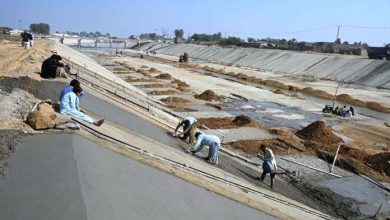How the world should help Pakistan with its never-ending flood disaster
The Washington Post October 3, 2022
When will Pakistan’s climate catastrophe finally subside? Over the past few weeks, as I’ve traveled around our flood-stricken country, I’ve been haunted by that question. I recently experienced an extraordinary boat journey in the floodwaters of Sindh province when my head was touching the wires strung between electricity poles. I was floating at least 16 feet above the ground. This water level was horrific because only some rooftops and trees were visible in the area. The United Nations has warned that floodwaters are rising again.
A few days ago, I met a man named Munawar Sami, who had lost his son and two daughters when a truck ran over them at the side of the road. Pointing toward his destroyed village a few hundred meters away, he explained: “We escaped from the floodwaters, but death followed us on this dry road.” He and his family were sitting at the side of the road because they had no shelter — not even a tent. He had received no compensation from the government despite many promises made by high officials. Thousands of flood victims like him are living on the sides of roads without any shelter. Most of them are still waiting for help.
The failings of Pakistan’s government always shape the response to natural disasters here: lack of funds, corruption, incompetence. But the fact remains that the unprecedented scale of this latest catastrophe makes it an entirely different kind of challenge. Angelina Jolie, who visited the flood-hit areas, said simply: “I have never seen anything like this.” Jolie visited Pakistan after the 2010 flooding, but she, like many others, has recognized that the magnitude of this disaster is extraordinary. After meeting many flood victims, she warned the international community that “if enough aid doesn’t come, they won’t be here in the next few weeks.”
During his visit to the U.N. General Assembly last month, President Biden urged world leaders to help Pakistan. Pakistani Prime Minister Shehbaz Sharif met Biden in New York and thanked him for his appeal. Sharif held important meetings on the sidelines of the General Assembly to push for new thinking on climate change. One of the few leaders who was able to meet both Biden and Russian President Vladimir Putin in recent weeks, Sharif is trying hard to get support for the flood victims of his country. He delivered an impassioned speech in New York, asking, “When the cameras leave, and the story just shifts away to conflicts like the Ukraine, my question is, will we be left alone to cope with a crisis we did not create?” He is focusing his efforts on the need for debt relief, an issue he also discussed with the heads of the International Monetary Fund (IMF) and World Bank.
Why does Pakistan need debt relief? A recent U.N. Development Program policy paper explained that the disaster in Pakistan has affected more than 30 million people and caused damage estimated at $30 billion. Pakistan is not responsible for this historic catastrophe. Experts estimate that global warming exacerbated the severity of the flooding. The rich nations that have done the most to accelerate warming are morally obligated to help Pakistan. Economist Jeffrey D. Sachs has declared: “If there was a global climate court, Pakistan’s government would have a strong case against the U.S. and other high-income countries for failing to limit climate-changing greenhouse-gas emissions.” He demanded climate justice for Pakistan. The IMF gave debt relief to 25 countries in 2020. Pakistan would hardly be the first country to ask for such help.
Economists warn that Pakistan is heading toward a financial emergency and that Sharif is not in a position to provide relief to millions of people displaced in the flooding. Pakistan was already contending with a giant debt burden even before the catastrophe struck. Deferment of its bilateral debt would save $1.13 billion in loan repayments this fiscal year, providing urgently needed space to the government to help flood victims. Japan has already provided debt relief worth $160 million. Officials from the U.S. Agency for International Development told me they are planning more aid; the United States has also announced it is extending substantial debt relief to Islamabad. France will also host an international conference by the end of this year to help the flood victims.
A World Bank study published last year predicted extreme flooding in Pakistan by 2035. Pakistan is not the only country vulnerable to such disasters. Yale University’s Environmental Performance Index identified other South Asian countries facing the same threats. These countries must learn lessons from the floods in Pakistan. Climate change is becoming a serious threat not only for our country but for the whole world. One country cannot defeat this enemy. We need a global war against climate change.
Opinion by Hamir Mir,








